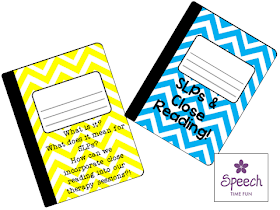According to Learning A-Z, "close reading" means that students get involved actively with texts they are reading. They should notice text features and language used by the author. They should be actively thinking while reading. They are required to evaluate and think critically about the texts they are reading.
What skills are required in order for our students to be successful with close reading in their classrooms?
- Asking and answering questions
- Understanding of common core vocabulary concepts
- Ability to infer and predict
- Perspective thinking: understanding what others would think
- Understanding text features
- Understanding author's purpose
- Understanding main idea and supporting details
- Ability to retell or summarize a plot
- and more!!
When teachers expect students to use this skill, they are expecting students to read passages about 3 times! I know my students struggle to read things once! It is important that students understand why they should use this skill and how it can benefit them. Well, how can it benefit them and why is it important?!
- Demonstrates understanding
- Can help predict comprehension questions that one may be asked
- Improves reading comprehension skills
- Uses the full range of Bloom's taxonomy
- Makes students active in the learning and reading process
How can we as SLPs help our students?! We work on skills necessary in order for them to be successful in the classroom. We can help improve these skills and then teach them how to use them during close reading tasks! I have several products in my TpT store that can help build these skills. Below are just SOME of them!:
I have also blogged about VARIOUS DIY ideas that can be used to work on these skills as well:
Remember, carryover carryover carryover!! Once skills are learned and mastered, if students aren't shown how to use these skills independently in the classroom, then the jobs not done!! We can model and practice with our students the art of close reading. You can take passages read in their classrooms or use your own, high interest texts you can find. You can elicit conversations with your students about the texts read. What are some ways you can do this?!:
I know I hope to attend some workshops or view some online webinars on close reading this summer. How do you plan on learning more?!
- You can use conversations starters. Show them how to start conversations about the text. For example, "I think the author wanted to tell us about..."
- You can model how to use post-its to write questions about the text or to highlight the key points. They can use their knowledge of main idea and supporting details for this one.
- Discuss the characters, their character traits and how they felt in various parts of the story.
- What connections can the students make to their own lives?
- What were the key story elements (setting, characters, problem, solution, mood)? Why were they important? Did the author explicitly say it, why or why not?
- Model for students to explain how they know what they know? Can they locate the evidence in the story?
- Be evidence detectives!! Who can find the most evidence to back up their opinions and analysis?!
Those are just several ways!!! There are so many ways...how can you teach your students to think about their thinking about texts read?!
I know I hope to attend some workshops or view some online webinars on close reading this summer. How do you plan on learning more?!

No comments:
Post a Comment